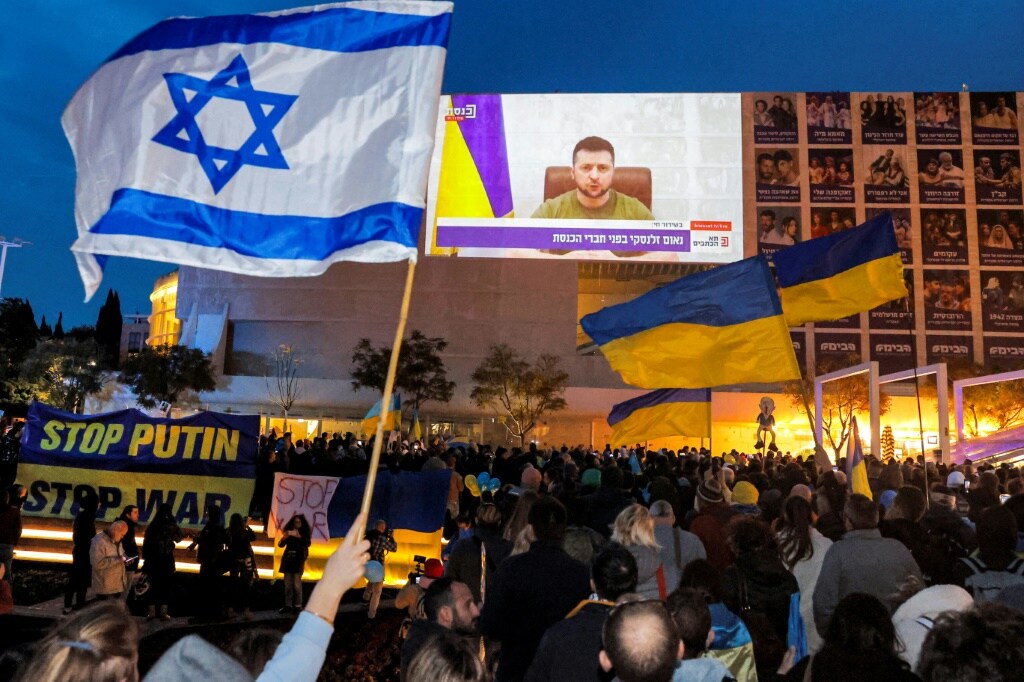President Volodymyr Zelensky complained bitterly about insufficient support while comparing Russia’s invasion of Ukraine to the Holocaust in a speech to the Israeli parliament on Sunday evening.
His appeal followed previous appeals via video-link to the British House of Commons and the American Congress in which he also made historical comparisons and appealed for more support. The West and NATO rejected his request for a no-fly zone out of fear of a direct military confrontation with Russia but agreed to send more weapons to Ukraine to defend itself.
In his speech to the Israeli parliamentarians, he recalled that Golda Meir, one of Israel’s most known prime-ministers, was born in Kyiv, then under Tsar-Russian rule. He quoted her as saying that an enemy that does not recognize your right to national self-determination does not give you much room for compromise.
He underlined that Jewish and Ukrainian history is intertwined and that Ukraine and Israel are facing the same threats of destruction from its neighbours. “Russia’s invasion of Ukraine is not just a military operation as it is presented in Moscow. It is a total and unjust war which is intended to destroy our people, our country, our cities, our culture and our children. Everything that makes us Ukrainians.”
In his distress, talking from his besieged capital, while Russian troops are indiscriminately bombing Ukrainian cities, Zelensky even claimed that Russia is using the same terminology as Nazi-Germany. “When they sought to destroy all of Europe, they didn't want to leave any of you, and now it’s directed against us. They called it the 'Final Solution'."
“What will remain of Ukraine’s cities after this war?”
Zelensky’s comparisons with the Holocaust were not accepted by all in the Israeli parliament. “I admire the Ukraine president and support the Ukrainian people in heart and deed, but the terrible history of the Holocaust cannot be rewritten,” Communications Minister Yoaz Hendel tweeted. “The war is terrible but the comparison to the horrors of the Holocaust and the final solution is outrageous.”
His speech was also broadcasted simultaneously at Habima Square in Tel Aviv. Its mayor Ron Huldai said that, “Putting any political consideration aside, we are witnessing an event where it's clear what the bad and what the good is, who the aggressor is and who the assailant is. It is a moment of moral clarity.”
Ukraine is desperately reaching out to Israel and other countries appealing for more support. The Ukrainian president wished that Israel would have delivered its anti-missile defence system Iron Dome to Ukraine and did not understand why no military help had been forthcoming. Israel’s assistance has focused on humanitarian help, including a field hospital but he did not mention that.
He reminded Israel that thousands of Ukrainians had helped to save Jews during the Holocaust and were recognised as Righteous Among the Nations by Yad Vashem, the Holocaust Remembrance Center in Jerusalem. Now, Israel needs to choose and make a similar decision and help to save Ukraine.
“What is it? Indifference? Sitting on the fence? I'm leaving an open question for you to answer. Indifference kills. Calculation of interests kill. You can navigate interests but not between good and bad," Zelensky said. “Why has Israel refrained from sanctions on Russia? Israel needs to give answers to these questions, and after that, live with them.”
Russia invaded Ukraine under the pretext of “de-nazifying” the country. The claim is patently absurd because Ukraine´s democratically elected president happens to be Jewish. His father fought in WWII in the Soviet Red Army against Nazi-Germany and lost family members in the Holocaust. Zelensky expects more support from the Jewish state and that explains his disappointment with Israel.
Israel has good relations with both Ukraine and Russia and is keen on mediating between them. Prime-Minister Naftali Bennett flew to Moscow on 5 March to meet Russian President Putin and has since then talked several times with the Ukrainian President. But is has also its own security interests to consider in Syria where it has an understanding with Russia to operate against Iran.
M. Apelblat
The Brussels Times

